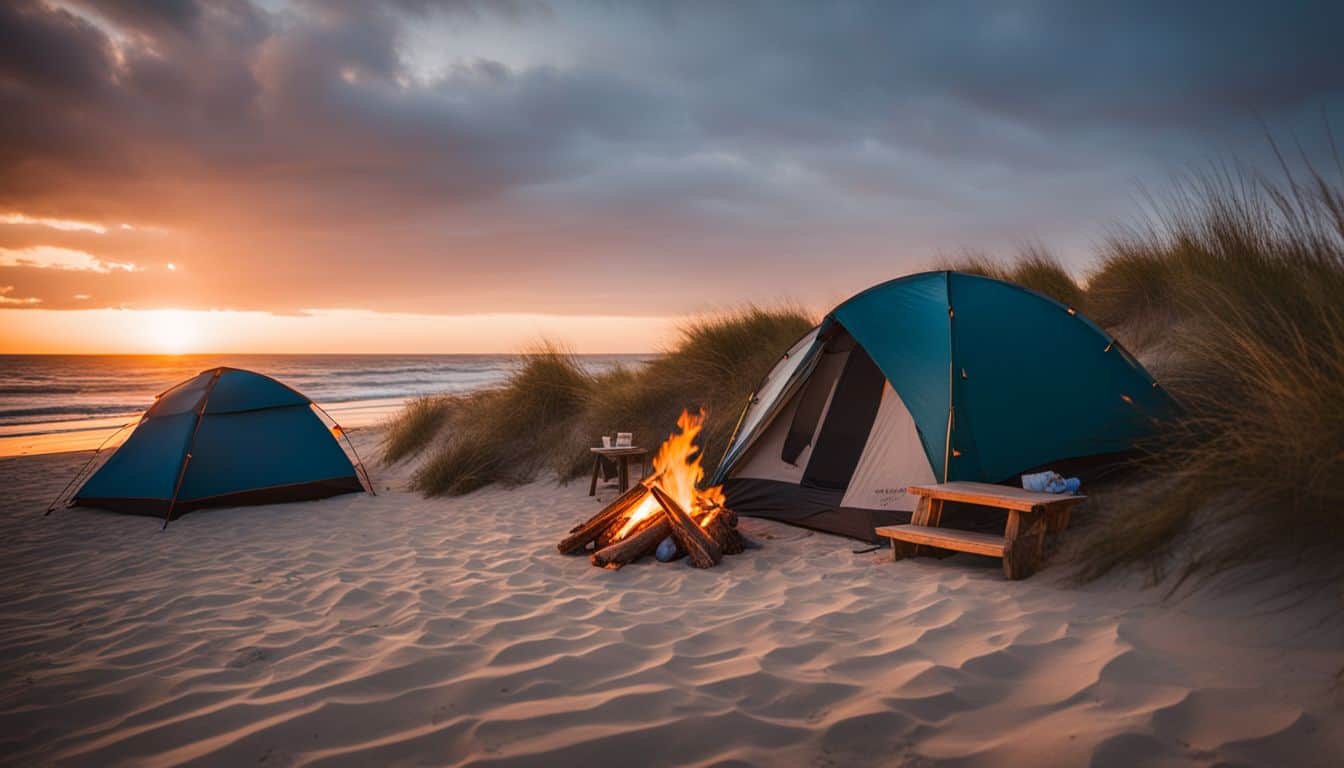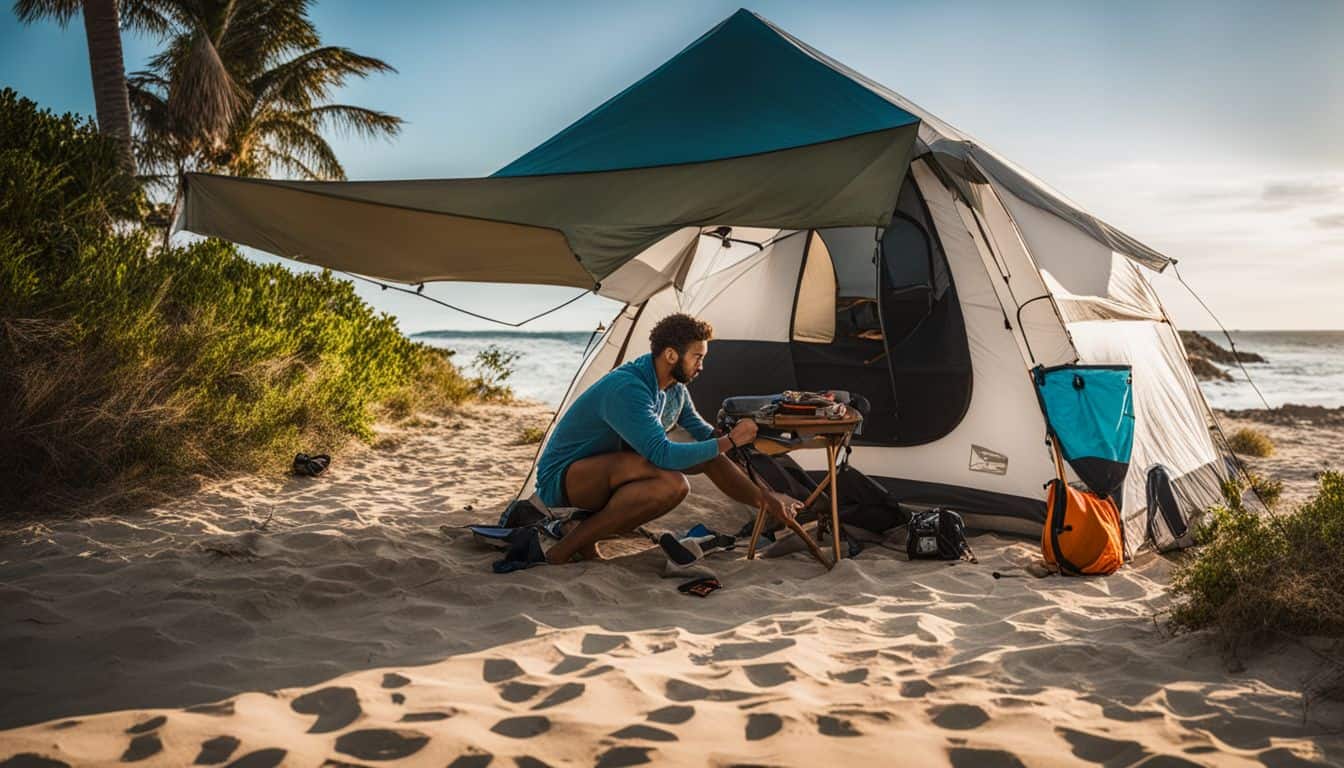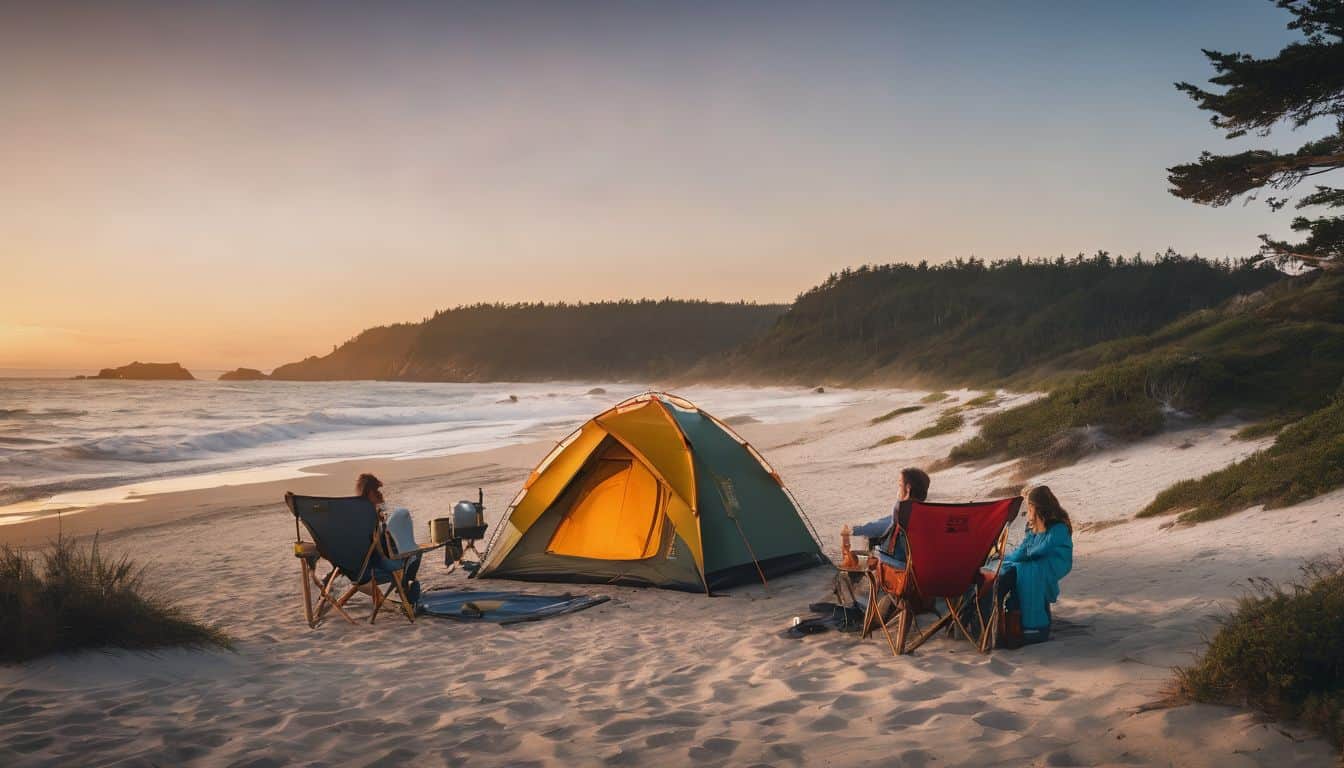Camping along the shoreline combines the thrill of outdoor adventure with the serene beauty of coastal landscapes.
The rhythmic sound of waves creates a peaceful backdrop for your outdoor experience.
Waking up to spectacular ocean sunrises offers moments that traditional campgrounds simply can’t match.
Choosing Your Location
Popular Beach Camping Destinations
Galveston Island State Park in Texas offers both bay and gulf coastlines for diverse water activities. Cape Lookout National Seashore provides 56 miles of unspoiled beaches for the adventurous camper. Sunset Bay State Park features protected sandy beaches nestled beneath towering pine-clad cliffs.
Additional Beach Destinations
- Assateague Island National Seashore, Maryland: Famous for its wild ponies and pristine beaches
- Hammocks Beach State Park, North Carolina: Accessible only by ferry, offering secluded camping behind dunes
- Second Beach, La Push, Washington: Beautiful Pacific Northwest coastal camping experience
- Sleeping Bear Dunes National Lakeshore, Michigan: Features stunning freshwater beaches and towering dunes
- North-South Lake Campground, New York: Lakeside camping in the Catskills with nearby hiking trails
- Southwick Beach State Park, New York: Offers waterfront sites along Lake Ontario’s shores
- Evangola State Park, New York: Natural sand beach camping along Lake Erie
- Spencer Beach Park, Hawaii: Crystal-clear waters perfect for snorkeling
- St. George Island State Park, Florida: Nine miles of untouched white sand beach

Smart Site Selection
Choosing the perfect beach camping spot requires careful consideration of both comfort and safety factors. Look for level ground that’s elevated enough to avoid high tide but protected from strong winds. Natural features like dunes can provide excellent wind barriers while maintaining access to ocean views.
Consider the direction of prevailing winds when positioning your tent. A slight slope can help with drainage during unexpected rain, but avoid areas where water might pool. Scout the area for signs of previous flooding or tide marks to ensure you’re well above the high-water line.
Natural shade from nearby vegetation can provide welcome relief from the sun, but maintain a safe distance from trees in case of strong winds. Always verify local regulations about minimum distances from the waterline and protected areas like dune vegetation.
| Consideration | Why It Matters | What to Look For |
|---|---|---|
| Distance from Water | Safety & Comfort | At least 100 feet from high tide mark |
| Ground Type | Tent Stability | Firm, slightly elevated sand |
| Natural Protection | Wind Buffer | Dunes or vegetation barriers |
| Accessibility | Emergency Access | Clear path to main beach access |
Essential Beach Camping Gear
Advanced Shelter Solutions
Your tent is your sanctuary from coastal elements. Consider these specialized options:
- Double-wall tents with full-coverage rainfly
- Extended vestibules for sandy gear storage
- Mesh panels for ventilation with sand-blocking lower walls
- Pop-up beach canopy for communal space
Strategic Gear Organization
Create zones in your campsite:
- Sleeping area (sand-free zone)
- Cooking station (wind-protected corner)
- Equipment storage (elevated platform)
- Beach activity area
Equipment Essentials Matrix
| Category | Must-Have Items | Optional but Recommended |
|---|---|---|
| Shelter | Tent, tarp, sand stakes | Screen room, beach umbrella |
| Sleeping | Sand-proof mat, sleeping bag | Cot, inflatable pillow |
| Cooking | Portable stove, windscreen | Dutch oven, collapsible table |
| Storage | Waterproof containers, mesh bags | Cargo nets, hanging organizer |
Sand Management Mastery
Prevention Strategies
Keep sand at bay with these proven techniques:
- Create a dedicated “transition zone” with mesh mats
- Use pressurized sprayers for gear cleaning
- Install a boot brush station at tent entrance
- Employ magnetic sand removal tools
Smart Storage Solutions
Transform your camp into a sand-free haven:
- Elevated storage systems using collapsible racks
- Sealed containers with rubber gaskets
- Mesh gear bags with fine screening
- Rolling storage carts with large wheels
Camp Kitchen and Comfort
Cooking Setup
Design an efficient beach kitchen:
- Wind-blocking station design
- Elevated cooking surface
- Dedicated hand/dish washing station
- Food storage cooling solutions
Practical Luxuries
Transform your campsite into a coastal retreat:
- Solar-powered lighting systems
- Compact camp furniture
- Privacy screens and changing room
- Portable power solutions
Water Management
| Usage Type | Daily Allocation | Storage Solution |
|---|---|---|
| Drinking | 1 gallon/person | Insulated containers |
| Cooking | 0.5 gallon/person | Collapsible jugs |
| Cleaning | 1 gallon/person | Large water carriers |
| Emergency | 0.5 gallon/person | Sealed containers |
Weather Safety and Monitoring
Environmental Awareness
Monitor local weather conditions and tide schedules throughout your stay. Coastal conditions can shift rapidly, requiring constant vigilance. Keep your camping equipment secured and watch for changing weather patterns.
Beach Safety Guidelines
Learn to identify rip currents before entering the water. Always swim with a buddy and stay within designated swimming areas. Watch for weather flags and respect posted warnings about water conditions.

Environmental Protection
Conservation Practices
Never dig holes or create trash pits in the beach environment. Keep all fires within designated containers and follow local fire regulations. Maintain distance from local wildlife and vegetation.
Leave No Trace Practices
Beach environments are particularly sensitive to human impact, making proper waste management crucial. Pack out everything you bring in, using dedicated containers for different types of waste. Bring separate bags for recyclables, compostable materials, and general trash.
Create a waste management station at your campsite with these features:
- Sealed containers to prevent wildlife access
- Mesh bags for collecting recyclables
- Dedicated compost container for food scraps
- Waterproof bags for wet waste
Never bury food waste or trash in the sand, as this can harm wildlife and affect the beach ecosystem. When breaking camp, perform a thorough sweep of your site, checking for micro-trash like bottle caps or food wrappers that might have blown away.
Consider bringing extra bags to collect any litter you find during your stay. This helps preserve the beach’s natural beauty for future visitors and protects marine life from harmful debris.
Weather Management
Temperature Control
Create a comfortable microclimate:
- Layered shade structures
- Cooling station setup
- Wind barrier configuration
- Natural ventilation channels
Remember to share your camping plans with a trusted contact before departure. Keep emergency contact information readily available. Following these guidelines ensures both your safety and the preservation of these beautiful coastal locations for future visitors.
Pro Tips for Success
- Arrive early to select the best site location
- Test all gear before your trip
- Create a modular setup for quick weather response
- Maintain a daily cleaning routine
- Document successful layouts for future trips
FAQs
What are the essential items to pack for beach camping?
When beach camping, it’s crucial to pack items that protect you from the elements and enhance your comfort. Essential items include a sturdy tent designed for beach conditions, sun protection gear like sunscreen and hats, plenty of water, and appropriate clothing for both warm days and cool nights. Don’t forget to bring beach-specific items such as sand stakes for your tent, a tarp for shade, and a portable shower or rinse station to remove sand.
How do I choose the best spot to set up my tent on the beach?
Selecting the right spot for your tent is critical for a comfortable beach camping experience. Look for a level area above the high tide line to avoid water intrusion. Choose a location that offers some natural windbreak, if possible, such as near dunes or vegetation. However, be mindful of local regulations and avoid disturbing protected areas. It’s also wise to position your tent with the smallest side facing the wind to reduce resistance.
What are some tips for dealing with sand while beach camping?
Dealing with sand is an inevitable part of beach camping, but there are ways to minimize its impact. Bring a large mat or tarp to place outside your tent as a sand-free zone. Use ziplock bags to protect electronics and food from sand. Consider bringing a small whisk, broom, and dustpan for quick cleanups. Additionally, baby powder can help remove sand from the skin more easily than water alone.
How can I ensure my food stays fresh during a beach camping trip?
Keeping food fresh while beach camping requires careful planning. Use a high-quality cooler with plenty of ice or ice packs, and consider bringing two coolers – one for frequently accessed items and another for longer-term storage. Pack perishables in watertight containers to prevent water from melting ice from spoiling the food. Plan meals that require minimal refrigeration and cooking, and consume perishable items early in the trip.
What are some eco-friendly practices to follow while beach camping?
Practicing eco-friendly beach camping is essential for preserving these delicate ecosystems. Always follow the “Leave No Trace” principles by packing out all trash, including food scraps. Use biodegradable soap for washing and do so away from water sources. Respect wildlife and plant life by observing from a distance and not disturbing habitats. Use designated fire pits if allowed, and fully extinguish fires before leaving. Lastly, use reef-safe sunscreen to protect marine life if you plan on swimming.
How do I manage campfires on the beach safely and legally?
Managing campfires on the beach requires attention to both safety and local regulations. First, check if campfires are permitted in your camping area, as many beaches prohibit them. If allowed, use designated fire pits or create a fire pit below the high tide line. Keep fires small and manageable, and never leave them unattended. Fully extinguish fires with water, not sand, as sand-covered embers can remain hot and pose a danger to barefoot beachgoers. Always check for fire bans or restrictions due to dry conditions.
What should I do to protect my camping gear from salt and moisture?
Protecting your gear from salt and moisture is crucial for beach camping. Regularly rinse and dry your equipment, especially metal components susceptible to corrosion. Apply a protective coating or lubricant to metal parts before the trip. Store gear in waterproof bags or containers when not in use. After your trip, thoroughly clean all equipment with fresh water and allow it to dry completely before storage to prevent mold and mildew growth.
How can I stay comfortable in hot weather while beach camping?
Staying comfortable in hot weather during beach camping requires some strategy. Choose a tent with good ventilation or a mesh roof. Set up shade structures like tarps or beach umbrellas. Wear light-colored, loose-fitting clothing made from breathable fabrics. Stay hydrated by drinking plenty of water and avoiding excessive alcohol consumption. Plan activities for cooler parts of the day, such as early morning or late afternoon. Consider bringing a battery-powered fan for additional cooling inside your tent.
What are some fun activities to enjoy while beach camping?
Beach camping offers a variety of enjoyable activities. During the day, you can engage in water sports like swimming, surfing, or kayaking. Beachcombing, building sandcastles, and playing beach games like volleyball or frisbee are great options. For a more relaxed experience, try sunbathing, reading, or practicing yoga by the shore. Stargazing, having a bonfire (if permitted), or taking a moonlit walk along the beach can be memorable experiences as the evening approaches. Always check local regulations and tide schedules when planning activities.
How do I handle waste management and sanitation while beach camping?
Proper waste management and sanitation are crucial for beach camping. Bring plenty of trash bags and pack out all waste, including food scraps. If there are no restroom facilities, use a portable camping toilet or practice proper cat-hole sanitation away from water sources and campsites. Carry hand sanitizer and biodegradable soap for personal hygiene. Use a wash basin for dishes and dispose of greywater away from water sources. Always follow local guidelines and leave your campsite cleaner than you found it to preserve the beach environment for future visitors.

Leave a Reply